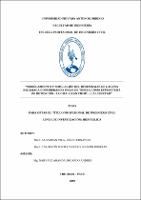| dc.contributor.advisor | Narváez Aranda, Ricardo Andrés | |
| dc.contributor.author | Albarrán Vila, Julio Fernando | |
| dc.contributor.author | Calderón Portocarrero, Johann Rogelio | |
| dc.creator | Albarrán Vila, Julio Fernando | |
| dc.date.accessioned | 2019-07-15T21:39:39Z | |
| dc.date.available | 2019-07-15T21:39:39Z | |
| dc.date.issued | 2019 | |
| dc.identifier.uri | https://hdl.handle.net/20.500.12759/5153 | |
| dc.description.abstract | En esta investigación se determinó que el embalse de la presa más adecuada fue la de 4.5m de altura, esto ante una avenida extraordinaria provocada por lluvias intensas. Primero se empezó realizando el estudio de suelos de la Laguna Sacamaca, apoyados en las pruebas realizadas en laboratorio se determinó que el material es una arena mal graduada con alto porcentaje de arcilla; luego se realizó el estudio hidrológico empleándose los datos de la estación hidrológica Lucma, cabe mencionar que los datos con los que se trabajaron fueron del año 2000 al 2018, después de procesar la información de precipitaciones se obtuvo, para un periodo de retorno de 100 años un caudal de 5.403 m3/s, el cual asumimos como caudal de diseño, después de ello se realizó el predimensionamiento de las presas, dando como resultado 1 presa de 3.5m de alto y otra de 4.5m de alto. Con las 2 presas mencionadas posteriormente se procedió a calcular el volumen total de embalse, siendo de 494.62 m3 para la presa de 3.5m de alto y de 810.35 m3 para la presa de 4.5m de alto, esto demuestra que la presa de 4.5m de altura almacena un 38.96% más que la presa de 3.5m de alto. Se realizó el cálculo de las dimensiones de un vertedero rectangular, tomando como caudal 5.403 m3/s que corresponde a un periodo de retorno de 100 años. Después de ello se procedió a realizar el análisis de estabilidad de Talud cuando la presa está llena y ante un desembalse rápido, tanto para la presa de 3.5m de alto como para la presa de 4.5m de alto. Finalmente se realizó la simulación de rotura de la presa de 4.5m de altura en el software IBER, se escogió esa presa y no la de 3.5m de altura, esto es debido a que presa de 4.5m de alto contiene más volumen de almacenamiento que ante la rotura de dicha presa generará una inundación mayor que la presa de 3.5m de altura. Se concluyó que ante la rotura de la presa de 4.5m de alto, la altura de agua que llegaría a la población sería de entre 0.70m a 0.90m. | es_PE |
| dc.description.abstract | The main objective of this thesis is to model and simulate the depopulation of the Sacamaca lagoon, using a maximum avenue of 100 years of return and establishing the basis to propose and design a suitable earth dam to retain the constant overflows of the Sacamaca Lagoon.
In this investigation it was determined that the reservoir of the most appropriate dam was 4.5m high, this before an extraordinary avenue caused by heavy rains. First, the soil study of Sacamaca Lagoon was started, supported by laboratory tests, it was determined that the material is poorly graded sand with a high percentage of clay; then the hydrological study was carried out using data from the Lucma hydrological station, it is worth mentioning that the data with which they worked were from the year 2000 to 2018, after processing the precipitation information was obtained, for a return period of 100 years a flow of 5,403 m3 / s, which we assumed as the design flow, after which the pre-dimensioning of the dams was carried out, resulting in a dam of 3.5m high and another of 4.5m high. With the 2 dams mentioned below, the total volume of the reservoir was calculated, being 494.62 m3 for the 3.5m high dam and 810.35 m3 for the 4.5m high dam, this shows that the dam of 4.5m height stores 38.96% more than the dam of 3.5m high. The calculation of the dimensions of a rectangular landfill was made, taking as a flow 5,403 m3 / s that corresponds to a return period of 100 years. After that, the stability analysis of slope was carried out when the dam is full and before a rapid disbanding, both for the 3.5m-high dam and the 4.5m-high dam. Finally, the simulation of breakage of the dam of 4.5m in height was performed in the IBER software, this dam was chosen and not the 3.5m in height, this is due to the fact that the 4.5m-high dam contains more storage volume than before the rupture of this dam, it will generate a flood greater than the dam of 3.5m in height. It was concluded that before the break of the dam of 4.5m high, the height of water that would reach the population would be between 0.70m to 0.90m. | en_US |
| dc.description.uri | Tesis | es_PE |
| dc.format | application/pdf | es_PE |
| dc.language.iso | spa | es_PE |
| dc.publisher | Universidad Privada Antenor Orrego | es_PE |
| dc.relation.ispartofseries | T_ING.CIVIL_1746 | |
| dc.rights | info:eu-repo/semantics/restrictedAccess | es_PE |
| dc.rights.uri | https://creativecommons.org/licenses/by/4.0/ | es_PE |
| dc.source | Universidad Privada Antenor Orrego | es_PE |
| dc.source | Repositorio Institucional - UPAO | es_PE |
| dc.subject | Desembalse rápido | es_PE |
| dc.subject | Simulación | es_PE |
| dc.title | Modelamiento y simulación del desembalse de laguna sacamaca considerando presa de tierra como estructura de retención - lucma - gran chimú - la libertad | es_PE |
| dc.type | info:eu-repo/semantics/bachelorThesis | es_PE |
| thesis.degree.level | Título Profesional | es_PE |
| thesis.degree.grantor | Universidad Privada Antenor Orrego. Facultad de Ingeniería | es_PE |
| thesis.degree.name | Ingeniero Civil | es_PE |
| thesis.degree.discipline | Ingeniería Civil | es_PE |
| dc.subject.ocde | https://purl.org/pe-repo/ocde/ford#2.01.00 | |
| renati.type | https://purl.org/pe-repo/renati/type#tesis | |
| renati.level | https://purl.org/pe-repo/renati/level#tituloProfesional | |
| dc.publisher.country | PE | es_PE |


